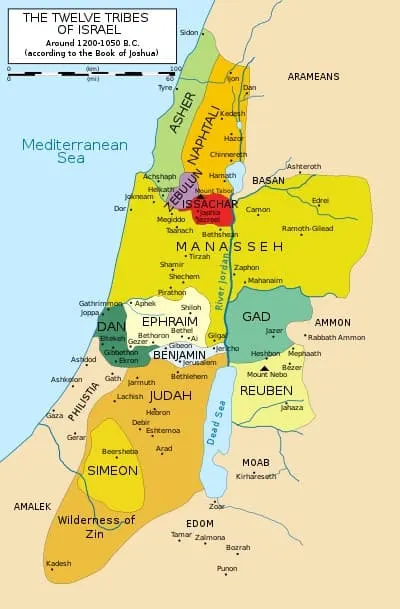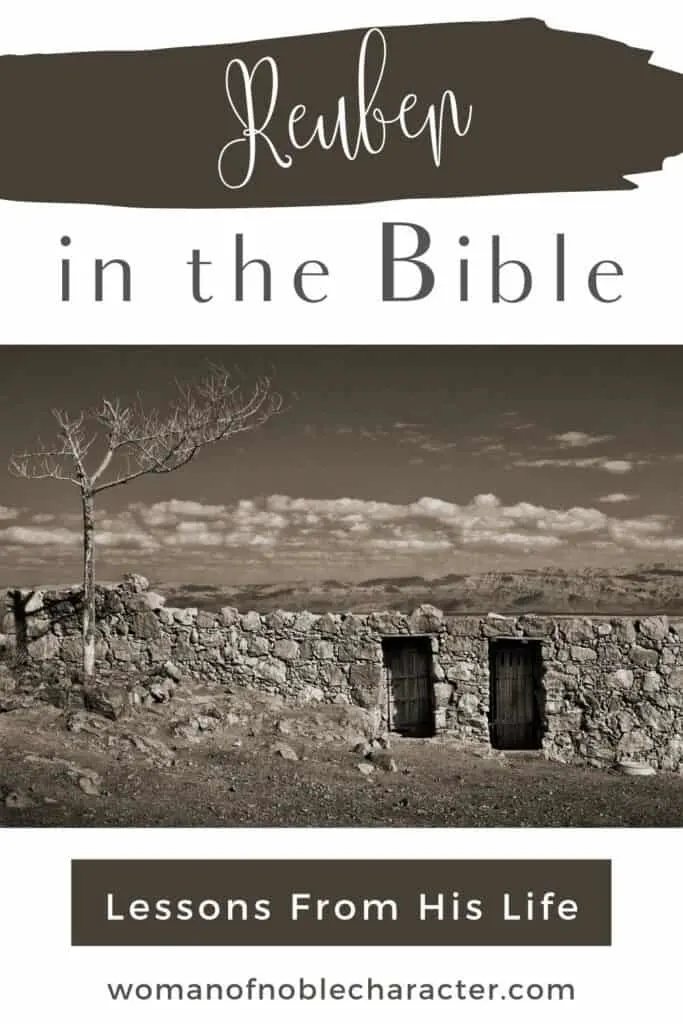This page/post may contain affiliate links. As an Amazon Associate, as well as an affiliate of other programs, this means if you purchase something using these links, I will receive a commission on qualifying purchases at no cost to you! For more detailed information, please visit our Affiliate Disclaimer page
Throughout the Bible, we read about the 12 Tribes of Israel. In this new series on Woman of Noble Character, we are going to explore each of the twelve tribes, in depth. Who they were, who their descendants were, where they resided and their biblical importance. For this first post, we are going to dive into the tribe of Reuben in the Bible.
You can find other tribes here: the Tribe of Simeon, The Tribe of Levi, the Tribe of Judah, the Tribe of Dan, the Tribe of Naphtali, the Tribe of Gad, the Tribe of Asher, the Tribe of Issachar, the Tribe of Zebulun, the Tribe of Joseph, the Tribe of Manasseh, the Tribe of Ephraim and the Tribe of Benjamin.
Before we do, for those that may not be familiar, the 12 tribes of Israel are named after Jacob ‘s 12 sons. They are, from first to last born, Reuben, Simeon, Levi, Judah, Dan, Naphtali, Gad, Asher, Issachar, Zebulun, Joseph (possibly Manasseh and Ephraim) and Benjamin.

Leah was the mother to Reuben, Simeon, Levi, Judah, Issachar, and Zebulun. Rachel, the mother of Joseph and Benjamin. Leah’s maid, Zilpha, gave birth to Gad and Asher, and Rachel’s maid, Bilhah, gave birth to Dan and Naphtali.
The Israelites all descended from these twelve sons of Jacob, and each maintained the identity of their respective tribes.
Reuben, the first of Jacob’s offspring, was said to be as “turbulent as the waters”
Reuben, you are my firstborn,
Genesis 49:3-4 (ESV)
my might, and the firstfruits of my strength,
preeminent in dignity and preeminent in power.
Unstable as water, you shall not have preeminence,
because you went up to your father’s bed;
then you defiled it—he went up to my couch!
His name is not etymological (relating to the origin and historical development of words and their meanings, according to the Oxford dictionary), but instead was named Reuben because it was related to the verb raʾah, “to see” and the fact that God has seen Leah’s sorrow as well as the noun ben, “son”. Biblical scholars believe that Reuben originally headed up the “confederation of Israelite tribes”.
In scripture, he is nearly always mentioned first in the listing of the twelve tribes of Israel (Genesis 46:8–23; Exodus 6:14–16; Numbers 1:5–15, 20–42).
Where the Tribe of Rueben Resided
The tribe made the decision not to settle in the Promised Land, but rather, asked Moses for some of the territories that they conquered east of the Jordan River. Moses agreed to this, with the condition that they help the western tribes in conquering Canaan (Numbers 32:28–32). The Tribe of Reuben did help conquer Canaan but did not battle with the other tribes during the period of judges (Judges 5:16). Perhaps, because they chose not to assist the other tribes in battle, the tribe and the tribe and the tribe is rarely mentioned in scripture beyond this.
In the early monarchy period (sometime around 3000 BC), the tribe of Reuben was widespread and had great numbers of sheep. They continued to fight desert tribes as they wandered the region (Transjordan – 1 Chronicles 5:9-10) The biblical and scholarly evidence for their residence includes the “Stone of Bohan the son of Reuben” (Joshua 15:6; 18:17), which biblical scholars identify as a point on the boundary between Judah and Benjamin.

In addition, Migdal-Eder, where Reuben is said to have slept with his father’s concubine, Bilhah (Genesis 35:21–22), is located near Jerusalem. In Ezekiel 48:6–7, Reuben’s frontier territory is described as lying north of Judah; the Song of Deborah does not state explicitly that Reuben dwells on the other side of the Jordan, but the mention of the “tribes” mishpetayim (Judges 5:16) and alludes to the tribe’s agrarian habits which point to that fact.
Reuben and his tribe enjoyed a prominent position in Israelite history prior to the conquest of Canaan (as well as when Joseph was sold). In connection with the sale of Joseph (Genesis 37:21–22, 29–30; 42:22, 37) and the rebellion against the leadership of Moses (Numbers 16).
It seems that Reuben was not the upstanding guy we would hope for the firstborn and first Israelite tribe leader and lives up to his reputation as “turbulent waters.” The tribe lost its standing due to the sins of Reuben. In Genesis 49:3–4, Jacob rebukes Reuben for “mounting his (Jacob’s) couch,” by sleeping with Bilhah, Jacob’s concubine. He curses him with the words “paḥaz kamayim al totar,” which is translated (as shown in the above-highlighted verse) as Turbulent as the waters, you will no longer excel.”
In essence, he lost his status as the first-born son. His loss of status resulted in a split of his tribe. Reuben became the tribes of Ephraim and Manasseh, and it was Joshua (from the tribe of Ephraim) who led the conquest of the land; At one time, the tribe of Reuben must have been dangerously close to going away, altogether. In fact, Deuteronomy 33 has only one short verse on it, and that, is a prayer for the tribe’s survival.

Another indication that Reuben lost his prominent position is the fact that no judges came from the tribe of Reuben as well as the fact that the tribe of Reuben is not mentioned in Mesha inscription or Mesha Stela, but Gad is.
During this time, the Reubenites established close familial ties with the western tribes. Enoch, Reuben’s son, has also been associated with the tribe of Midian. Reuben’s family tree points to the fact that he and his tribe had close ties with other Israelite tribes, as well. (Numbers 26:5–9; 1 Chronicles 5:1–8)
Reuben’s Tribe Helped to Build the Great Altar
We also know that the Reubenites helped with the building of a great altar.
And when they came to the region of the Jordan that is in the land of Canaan, the people of Reuben and the people of Gad and the half-tribe of Manasseh built there an altar by the Jordan, an altar of imposing size.
Joshua 22:10 (ESV)
There are, however, no more biblical references that I can find that mention this again or elaborate on the Reubenite’s involvement in the building of the great altar.
Reuben in the Bible: His Blessing from Jacob
Then Jacob called his sons and said, “Gather yourselves together, that I may tell you what shall happen to you in days to come.
Genesis 49:1-4 (ESV)
“Assemble and listen, O sons of Jacob,
listen to Israel your father.
“Reuben, you are my firstborn,
my might, and the firstfruits of my strength,
preeminent in dignity and preeminent in power.
Unstable as water, you shall not have preeminence,
because you went up to your father’s bed;
then you defiled it—he went up to my couch!
Jacob has gathered his children, and we read, “so that I can tell you what will happen to you in days to come.”
This is not to be a reading of his last will and testament. They are not going to hear of what possessions he has left to each one of them. Jacob was going to speak to them about their individual immediate futures, but also, more importantly, their future to the last days.
Here are treasures for them to mull over and then hand on so that future generations will also keep them in store. What he tells them was certainly going to happen; no power in heaven or hell could prevent it.
Jacob, in the same way, is sharing what futures lie ahead for his sons.
What about us? Don’t we face the same type of future dealt with by the God of the patriarchs and the God of the apostles? If we live as Christ lived and bear testimony to what he has taught us then we are going to be facing trials and challenges, the revelation of the man of sin, but we also know that the earth is going to be filled with the knowledge of the glory of God as the waters cover the sea.
Jacob’s words of encouragement to his sons were not only wise but also filled with inspiration. He knew that the Holy Spirit was working within him, guiding each word as it came out of Jacob’s mouth to share the prophecies given to him.
So as Jacob lay dying, he says to his son, Reuben:
“Reuben, you are my firstborn, my might, and the first fruits of my strength,” and yet he never got the birthright – even though he was the firstborn and his father’s delight. It was not given to him because he violated the common law wife of his own father. He had relations with Bilhah the mother of his half-brothers.
That was the sort of man Reuben was. He broke his father’s heart, the boy in whom he had such hope. He said to him, “you went up to your father’s bed; then you defiled it—he went up to my couch!” (verse 4).
Reuben was the kind of man who had no morality at all, the kind of morality not mentioned among the heathen – he was Jacob’s firstborn. He was not going to inherit the privileges of the firstborn. He was not going to be the one through whom the promised Seed would be born who was to bless the nations. You can just hear Jacob’s anguish! He had such hopes for his firstborn, and to see what he has become must have been heartbreaking to him.
So, Jacob spoke to Reuben and, under the inspiration of the Holy Spirit, told him that he would not have preeminence. The blessing had to be taken away from him because of how he behaved and lived. He had not observed God’s laws. He had not shown his love and honor to his father. He had been covetous and full of vain ambitions.
Reuben felt if he took his father’s concubine, then his place as the firstborn would be unchallengeable. That was not the way to God’s blessing. “you shall not have preeminence” (verse 4), said his father. Not now. Not after that. Never would he excel. There was a curse in Jacob’s words to Reuben, and those words still stand over those who practice that kind of morality. They live under a curse. His life had begun with such a hope, a man holding to his heart his own son, but tensions between two wives spoiled it, and the shadows deepened, and Reuben robbed himself of the blessing by living to himself. He robbed his posterity of the great blessing of the God of Abraham, Isaac, and Jacob because he defiled a bed.
What Can We Learn from the Tribe of Reuben in the Bible?
An impulsive decision can have a lasting (or eternal impact)
Reuben, as you know, lost his birthright due to some poor decisions. We have a gift far greater than Reuben’s birthright. Christ gives us the gift of salvation. While we can’t lose our inheritance in Christ (we are coheirs with Christ!), we can hurt God and our relationship with Him when we choose to sin.
Then they despised the pleasant land,
Psalm 106:24 (ESV)
having no faith in his promise.
What shall we say then? Are we to continue in sin that grace may abound? 2 By no means! How can we who died to sin still live in it?
Romans 6:1-2 (ESV)

Jealously Can Ruin You and Your Relationship with God
acob didn’t even attempt to hide the fact that he loved Rachel more than Leah (Genesis 29:30). Despite Leah having the honor to bear Jacob’s first children, Jacob continued to show his preference for Rachel. After all the children were born, family jealousies intensified when Jacob gave preferential treatment to Rachel’s two sons, Joseph, and Benjamin.
Of Reuben’s boyhood, only one incident is mentioned. Reuben “found mandrakes in the field and brought them to his mother Leah” (Genesis 30:14).
Mandrakes are a special type of herb that the peoples of the Middle East regarded as an aid to conception. Their aroma was associated with lovemaking. (Song of Solomon 7:13) A boy would be better off not having the knowledge of or the interest in a supposed love potion.
The motivation for Reuben’s gift? Apparently, it was sympathy and jealousy on behalf of his mother, who had been slighted all along by his father, and then, on top of that, Leah seemed to stop bearing children. It seems Reuben wanted his mother to maintain fertility to gain increasing honor compared to Rachel. If this was the case, it seems he was overly concerned about the prestige of his immediate family, even as a boy.
We later learn how his jealousy and poor decisions led to his downfall.
The form you have selected does not exist.
Own up to your sin, but Mostly Avoid it at All Costs
Have you ever sinned and thought, “No one will know. It won’t matter if they don’t know”? First, God knows. Second, the sin will come back around, and you will be judged, or even punished for it. Reuben sinned. Others found out. Both he and his descendants paid the price. While we all try not to sin, we must be extra careful not to sacrifice our future because of the here and now. We need to be aware of sin and avoid temptation constantly. The implications of sin are often unknown, at the time and uncertain, but the costs will certainly outweigh the immediate gratification.
Additional Resources on Reuben in the Bible
For a sermon on Reuben, you may enjoy this one from Pastor Omar Thibeaux on the life (and downfall) of Reuben:
For additional reading, you may enjoy these recommended resources on the Tribe of Reuben in the Bible and The Lost Tribes of Israel.
The 12 Tribes of Israel (or is it 14?) & Lessons We Can Learn by Susan J Nelson
Did you learn anything new about Reuben or the tribe of Reuben in the Bible? Do you know of something interesting that I may have missed? Tell me in the comments below. I’d love to hear from you!
Because He Lives!
Sue
ESV – “Scripture quotations are from The ESV® Bible (The Holy Bible, English Standard Version®), copyright © 2001 by Crossway, a publishing ministry of Good News Publishers. Used by permission. All rights reserved.”

